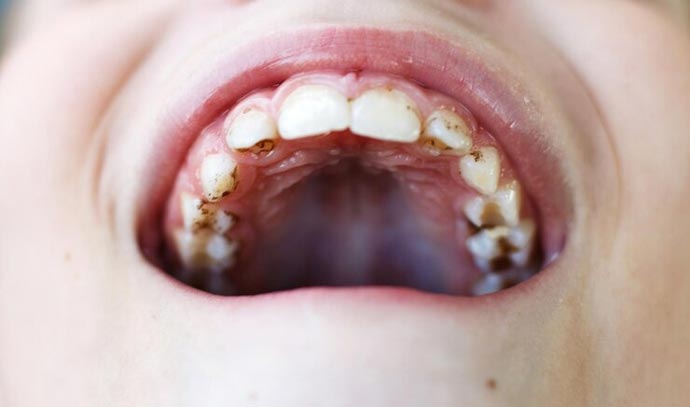Cavities are permanently damaged areas on the surface of your teeth, these lead to tiny holes or openings on teeth. Tooth decay is another word for cavities, this is caused by not brushing your teeth adequately to remove food particle residue from your teeth, over a short period of time bacteria will multiply in your mouth which promotes plaque formation; plaque is acidic which ends up dissolving your teeth causing cavities. If you are concerned you have a dental cavity you should contact your local chelterham dentist who will be able to assist you with a treatment plan suited to your individual needs.
Table of Contents
Stages of Cavity Formation
Early Stage
When a cavity first starts to form it creates a small hole in the tooth enamel, the cavity forms at different rates for different people depending on how well they brush their teeth and how much sugar they eat on a daily basis. If somebody brushes their teeth regularly and does not overindulge on sugar food and drinks the cavity will take several months to dig into the deeper structures of the tooth.
At this point you may notice symptoms of a cavity appearing, you may notice that your teeth are more sensitive to hot or cold food and drink; you may also feel soreness or pain on the affected tooth or you might even notice small holes in the tooth at close inspection. If you visit the dentist every 6 months your dentist will likely spot a cavity at an early stage, when the dentist fills the cavity they will remove infected parts of the tooth and give your tooth a proper clean to remove the bacteria, they will then fill in the areas of the tooth that were eaten away by the bacteria and plaque.
Late Stage
If a cavity is untreated for more than a year the small holes that have formed on your teeth can cause a more serious problem. Within this stage, the bacteria has mostly eaten through the protective tooth enamel that protects your teeth from cavities forming. Once this has happened the bacteria can make its way into the softer structures of the teeth like the tooth root and tooth pulp. Within the softer structures of the tooth the blood vessels that allow you to feel your teeth live in this area. If the cavity is allowed to get worse the tooth root and tooth pulp will become infected which can lead to the tooth dying. Around this time you may notice your teeth becoming painful, sore, brittle, or loose. You may also start to notice tooth discolouration, where the tooth could start turning brown, black, or dark yellow. Additionally, you may notice that your gums start swelling or turning red.
Long-Term Untreated Tooth Decay
After two years or longer severe damage to your tooth is likely. At this stage you may notice that the teeth that have untreated cavities have increased discoloration, you may also notice swelling around the gums and severe pain and sensitivity around the affected teeth. At this point the bacteria will have most likely damaged the tooth root and pulp, leading to you probably losing the tooth. Bacteria from your tooth decay may spread to other teeth and your gums which may cause an infection in your mouth and possibly nose.
After this point cavities only get worse and can cause tooth loss not only to the tooth that was originally affected but also the surrounding teeth that may have been infected as a result, your gums will likely be negatively impacted in the process as well. If you think that you have a cavity in any of these three stages you should book an appointment with your dentist as soon as possible.
How to Avoid Tooth Cavities
- Brush Your Teeth For 2 Minutes Twice A Day: Brush your teeth properly with fluoride toothpaste and a good quality toothbrush that you change at least every 3-4 months. If you want to maximise your chances of taking good care of your teeth you should buy a good quality electric toothbrush as this maximises your chances of reaching all areas of your tooth with your toothbrush.
- Use Mouthwash: Using mouthwash before you brush your teeth can further reduce the amount of bacteria that remains in your mouth, mouthwash may also wash away some of the food particles in your mouth reducing future bacteria buildup. Mouthwash is more effective when used before brushing your teeth if you use mouthwash after brushing your teeth the mouthwash may actually remove some of the fluoride that the toothpaste provides.
- Reduce Your Intake Of Sugary Food And Drinks: The NHS recommends that you should not have more than 35 grams of sugar a day. To give you an idea of how much this is, a can of Coke has 39 grams of sugar in it. By identifying foods and drinks that have a lot of sugar in them and reducing how often you consume them you can reduce your regular consumption of sugar. You can easily find this information on most food and drink packaging, normally there is a food traffic light system; food and drinks that have the colour red should be consumed rarely as a treat. Those that are orange should be consumed in moderation and those that have a green traffic light can be eaten whenever.
Conclusion
Cavities in teeth can cause significant problems which only get worse over time, it is important that as soon as you suspect you may have a tooth cavity or any other oral health complication to book an appointment with your dentist as soon as possible.

